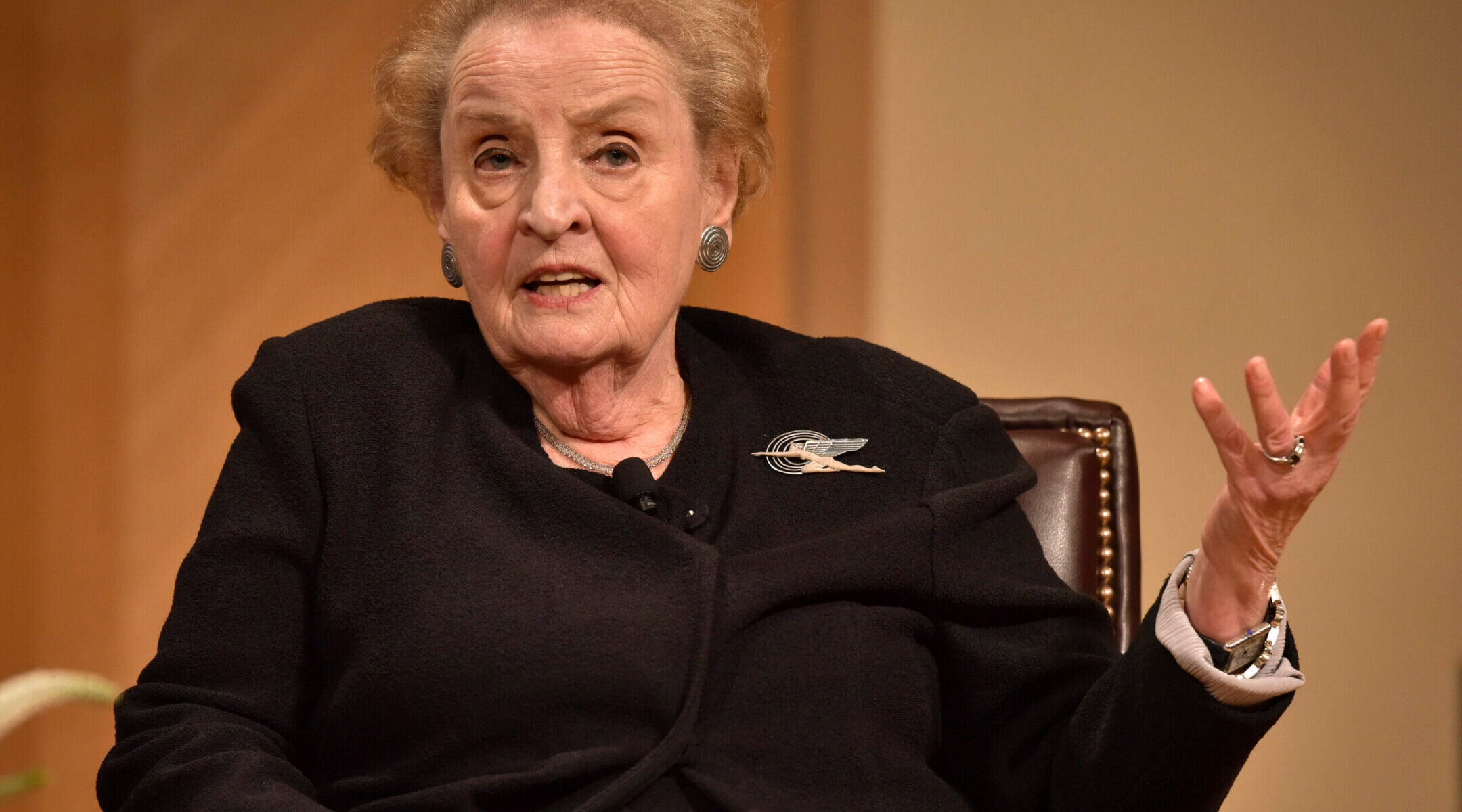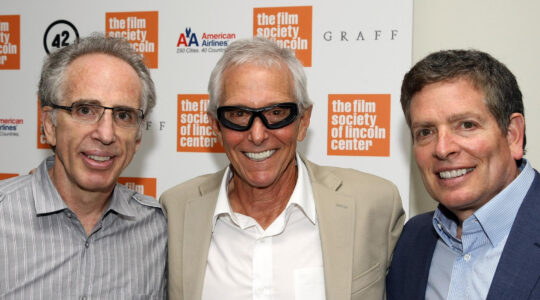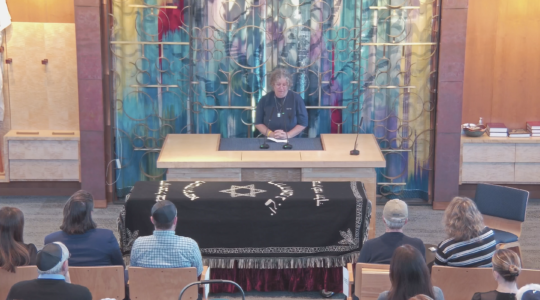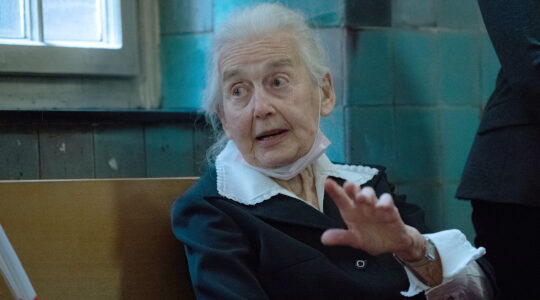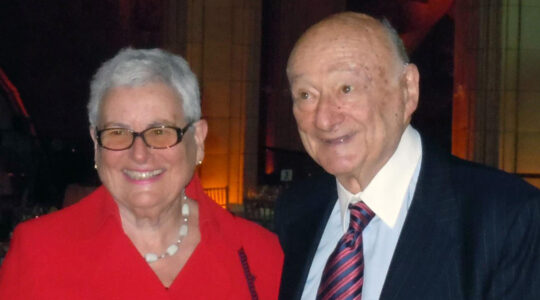WASHINGTON (JTA) — Madeleine Albright was the quintessential late 20th-century Jewish diplomat, haunted by the Holocaust and determined to use what tools her adopted country had to crush inhumanity when it arose.
Except she didn’t know she was Jewish until she was in her 50s, or so she claimed, a revelation that led some Jews to embrace her and others to question whether, like so many others, she had been driven by persecution into denial.
Albright, 84, died Wednesday of cancer, 25 years after making history by becoming the first woman to serve as U.S. secretary of state.
“The world has lost a champion for democracy,” said Tamara Cofman Wittes, who was mentored by Albright when they both served on the National Democratic Institute, and who has been nominated for a senior State Department position under President Joe Biden. “America has lost one of its greatest (as she always said, grateful) patriots. Women have lost a trailblazer and role model. The Albright family have lost their precious matriarch. I have lost a cherished friend.”
Albright was adept at outmaneuvering statesmen — always men — who thought they knew much better than she did. She also delighted in subsequent years in the fact that two close friends, Hillary Clinton and Condoleezza Rice, followed her into the secretary of state role, to which she had been nominated by Clinton’s husband, President Bill Clinton.
Albright hated macho posturing. If she had a credo, she stated it at the U.N. Security Council in 1996, after the Cuban air force shot down two small civilian craft attempting to flee the country, killing four people aboard. “Frankly, this is not cojones,” she said. “This is cowardice.” She called State Department bureaucrats, whom she never fully trusted, “The White Boys.”
But though she cherished the feminism she embraced in her 40s when her husband, a newspaper fortune heir who made her wealthy, abruptly left her for another woman, her drive was informed less by her status as a woman than as a two-time refugee: in 1939, fleeing her birthplace, Prague, as a toddler, and then in 1948, when she was 11, fleeing the city once again as Communist troops moved in.
That sensibility informed her tough-minded diplomacy. Clinton’s second term marked a shift in his diplomatic footing from the Vietnam war opponent wary of American involvement overseas to a robust interventionist whose policies and credible threat of military force helped end carnage in Bosnia, Kosovo and Iraq, and expanded the NATO footprint right up to Russia’s doorstep.
Key to that transition, which still reverberates in the crippling American sanctions on Russia for its war against Ukraine, was switching secretaries of state from the reserved and camera-shy Warren Christopher to the gabby, soundbite-friendly Albright.
Albright, an early backer of Bill Clinton when he was a relatively unknown Arkansas governor, was his first U.N. ambassador, repayment in part for the money she helped raise for his campaign. She chafed at her relative lack of influence in the administration, however; Clinton’s lack of action in Rwanda infuriated her.
Years later, she still fumed, telling an interviewer who challenged her on her efforts at the United Nations to preclude an international effort to stop the genocide that she was “glad you asked that.”
“President Clinton has said repeatedly that failure to act in Rwanda was the biggest policy mistake of his presidency,” Albright told The Washington Post in 2014. “It’s my biggest regret from that time.”
As she matured into her role as U.N. ambassador, she could no longer contain herself. The images of Serbs forcing Bosnian Muslims onto rail cars reminded her of the Holocaust, in which many members of her extended family were murdered. She lobbied for airstrikes against Serbian targets, once telling Colin Powell, then the chairman of the Joint Chiefs of Staff, “What’s the point of having this superb military you’re always talking about if we can’t use it?” Powell, famous for his Vietnam-era-founded reluctance for military intervention, said the question nearly caused him an “aneurysm.”
As secretary of state, she could, and did, address the frustrations she had endured as U.N. ambassador. She was behind Clinton’s decision to confront the Serbian military in 1999 as it bore down on Kosovo. Yugoslav strongman Slobodan Milosevic once told her, “Madam Secretary, you are not well informed.” Albright, whose father Josef Korbel, had served as a diplomat in Belgrade, countered, “Don’t tell me I’m uninformed — I lived here.”
She also muscled Boris Yeltsin’s Russia into not blocking the entry into the NATO alliance of Poland, Hungary and the Czech Republic.
Facing down men who thought they could outwit her was more a vocation than a pastime. In 1998, at U.S.-mediated talks with Palestinian leader Yasser Arafat at Wye River, Maryland, Israeli Prime Minister Benjamin Netanyahu was resisting concessions as Bill Clinton sought to advance the Oslo Accords Netanyahu had reviled.
Netanyahu planned a dramatic signal that he was ready to leave the talks. He ordered his team to place their suitcases in front of their cabins.
Albright caught wind of the scheme. She knew that Yitzhak Mordechai, Netanyahu’s defense minister, jogged; she also knew that Mordechai didn’t think as highly of Netanyahu as Netanyahu thought of himself. She drove out to where Mordechai jogged and asked him to chat. They did, he bent over to kiss Albright, who barely stood 5 feet, on the cheek, and Mordechai and his staff did not place their suitcases on the porch. Netanyahu went back to the talks and Clinton secured the Wye River Accords.
As secretary of state, she helped engineer the ouster of Boutros Boutros-Ghali as U.N. secretary-general, in part because when she was ambassador to the United Nations he resisted her pressure to not publish a report blasting Israel for its killing of civilians during a conflict in Lebanon in 1996.
The ethos that brought Albright to diplomacy was one that spurred so many other American Jews to enter public service, a dedication borne of the horrors of the midcentury to seek a benevolent American hegemony in its latter half and into the 21st century.
“I am an optimist who worries a lot,” is how she characterized her outlook when she spoke in Cambridge, Massachusetts in 2012 on a book tour.
Her optimism may have blinded her to how deeply embedded in Iran’s political culture was its resistance to compromise. At her urging, Clinton suspended tough nuclear sanctions on the country — ones he had just imposed — so she could deal with Mohammad Khatami, an ostensible western-looking moderate. Khatami’s initiatives were sidelined by the hardline theocracy, and American administrations did not take seriously Iran’s nuclear threat until President Barack Obama imposed far-reaching sanctions in 2010, after Iran was well along in its program.
Jewish organizations saw her as a formidable if sometimes contentious ally. “She was tough on negotiating and debating issues but a warm caring human being in one-on-ones,” said Abraham Foxman, who led the Anti-Defamation League when Albright was in government. “The epitome of mensch in the best and broadest sense of the word.”
But Albright’s mastery of the 20th century caused many Jews to find odd her claim in 1997, after a lengthy Washington Post exploration of her past, that she only learned from the newspaper that she was Jewish. The Post story recounted the efforts of a Jewish cousin and a Czech mayor to get in touch.
Inconsistencies in Albright’s recounting of the revelation didn’t help. She would say at times that it was the Post that brought her the news, and at other times that it was government vetters who were digging into her past as she was under consideration for senior spots in government. That led to difficult questions: If Albright knew she was Jewish in 1993 or 1994, why did she not reveal it until 1997, when a newspaper was about to go public?
Her parents, assimilated Jews who converted to Roman Catholicism and then to Episcopalianism, hid her Jewishness from her to protect her, but how could she not be curious about the death of three of four grandparents, who turned out to have been have murdered by the Nazis, as were others in her extended family?
“Was Madeleine Albright afraid to come to terms with her past because she thought it might hurt her future?” Lisa Hostein, JTA’s editor-in-chief in 1997, wrote at the time. “Maybe she was afraid that her stature would be diminished before her international colleagues if they knew of her Jewish roots. Maybe she felt her aspirations to become secretary of state would be jeopardized if her family history was confirmed.”
Hostein articulated difficult questions for Albright from Jews who were out in public life and bore their identity’s slings and arrows as well as its joys.
“In an age when Jews in America worry about the future of Jewish survival not because of anti-Semitism, but because of assimilation, tales of such rejection ring especially cruel,” Hostein wrote.
Some Jewish leaders accepted Albright at her word. Czech Jewish leaders noted that they had accompanied her to Jewish sites in Prague before and after the revelation; after she knew she was Jewish she was much more emotional, they told JTA in 1997, during her visit to Prague in July of that year.
“It is common for Jews from this part of the world to be ignorant of their Jewish roots,” said Tomas Kraus, then executive director of the Federation of Jewish Communities in the Czech Republic. “A substantial number of Czech Jews have only recently discovered their ancestry.”
Albright did not like to talk about her parents’ choice to keep her in the dark, but when she did, it was in the voice of a blunt-edged diplomat who understood how the 20th century robbed some people of agency, and how they did what they had to do to reclaim it.
“My parents were fabulous people who did everything they could for their children and brought us to this amazing country and were protective, overly so in terms of worrying about us and all kinds of things,” she told the Post in 1997. “I can’t question their motivation. I can’t. I don’t know how else to put it.”
JTA has documented Jewish history in real-time for over a century. Keep our journalism strong by joining us in supporting independent, award-winning reporting.
